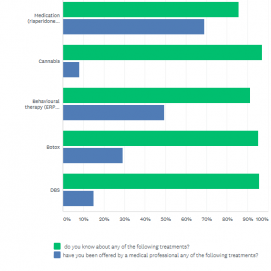Category menu
European Tourette Syndrome Research Survey 2017-18
Posted on 16 July 2018
A brief summary of the results from the first ever European patient survey
The European Tourette Syndrome Research Survey 2017 -2018, was carried out by Dr Seonaid Anderson research manager of Tourettes Action, as agreed during a meeting of the European patients associations at the 10th European Conference on Tourette Syndrome and Tic Disorders (ESSTS) in 2017. This survey was conducted to examine the patient’s perspective on research in terms of what patients across European countries want and need. This was the first time ever patients and their families with Tourette Syndrome across European countries, were invited to help inform researchers what they would like Tourette Syndrome research to focus on.
The survey was created based on a patients survey carried out in Holland in 2017. There was no funding for this project and the survey was translated into 14 languages without using a professional translation company. The Patients Associations in different European countries were contacted via Facebook and via ESSTS (European Society for the Study of Tourette Syndrome). Patient association representatives were asked if they would be keen to help with verifying translations and to circulate the survey in their countries. The 14 language versions of the surveys gathered data using Survey Monkey. The online survey was open for six months and 2,269 responses were collected. English language responses were the highest followed by Dutch and Norwegian. However, a surprising result was that people from all over the world completed the survey – including Japan, India, Reunion Island (in the Indian Ocean) and Mexico!
The main findings were that 27% of all respondents to the survey would prefer research into finding out the cause of Tourette Syndrome; whilst 73% would prefer research into how to treat TS and/or make symptoms better.
When asked which were the most important areas to do research on it was daily living issues (such as dealing with TS at home, work and school) and problems other than tics related to TS (other symptoms/co-occurring conditions) for example: sleeping, anger, panic etc. that most people chose as the top priorities.
Another question asked was if people had heard of a variety of treatments for TS and whether they had been offered such treatments. An interesting point to note is that different countries seem to have a different relationship with treatments involving Cannabis derivatives, for example this seems more common in Holland than other EU countries. The general trends from this question were that most people had heard of the variety of treatments for TS but fewer were offered to them. Medication was most likely to be offered, with far fewer being offered cannabis-like treatments. Of course, many people had heard of DBS (deep brain stimulation) but far fewer had been offered it as it is only considered for adults with severe TS, which has not responded to other treatments.
Known about and offered types of treatments.

This was the first time ever patients and their families with Tourette Syndrome across European countries were invited to help inform researchers what they would like Tourette Syndrome research to focus on. The results of this survey were presented at the 11th European Conference on Tourette Syndrome and Tic Disorders & 2018 Annual Meeting of the European Society for the Study of Tourette Syndrome in Copenhagen.
The results were also published on the open access publishing platform F100Research. Anderson S. European Tourette Syndrome research survey 2017-2018. F1000Research 2018, 7:1039 (doi: 10.7490/f1000research.1115783.1).
Download the PDF file on this page to view the results of the survey.
This survey helps encourage relationships with the patient and research communities. Leading on from this work, at the ESST conference this year, a working group was formed with patient association representatives and researchers and clinicians to draft Guidelines for patient’s participation in research leaflet. This will result in a leaflet for researchers which outlines why researchers should engage patients in every stage of their research. The aim is to encourage researchers to engage patients to advise them on research design and planning. Patients have specific knowledge about their care, treatment and lifestyle which can inform research. Researchers can also use the assistance of patients in communicating the end results of research to a broader audience than the one targeted by scientific publication.
A quote which sums up the ethos behind this working groups’ aims is:
“No matter how complicated the research, or how brilliant the researcher, patients and the public always offer unique, invaluable insights. Their advice when designing, implementing and evaluating research invariably makes studies more effective, more credible and often more cost efficient as well.” Professor Dame Sally Davies Chief Medical Officer (2009).
If you have any comments or questions please contact Dr Seonaid Anderson, research manager Tourettes Action Seonaid@tourettes-action.org.uk


